EX-19.2
Published on January 14, 2025
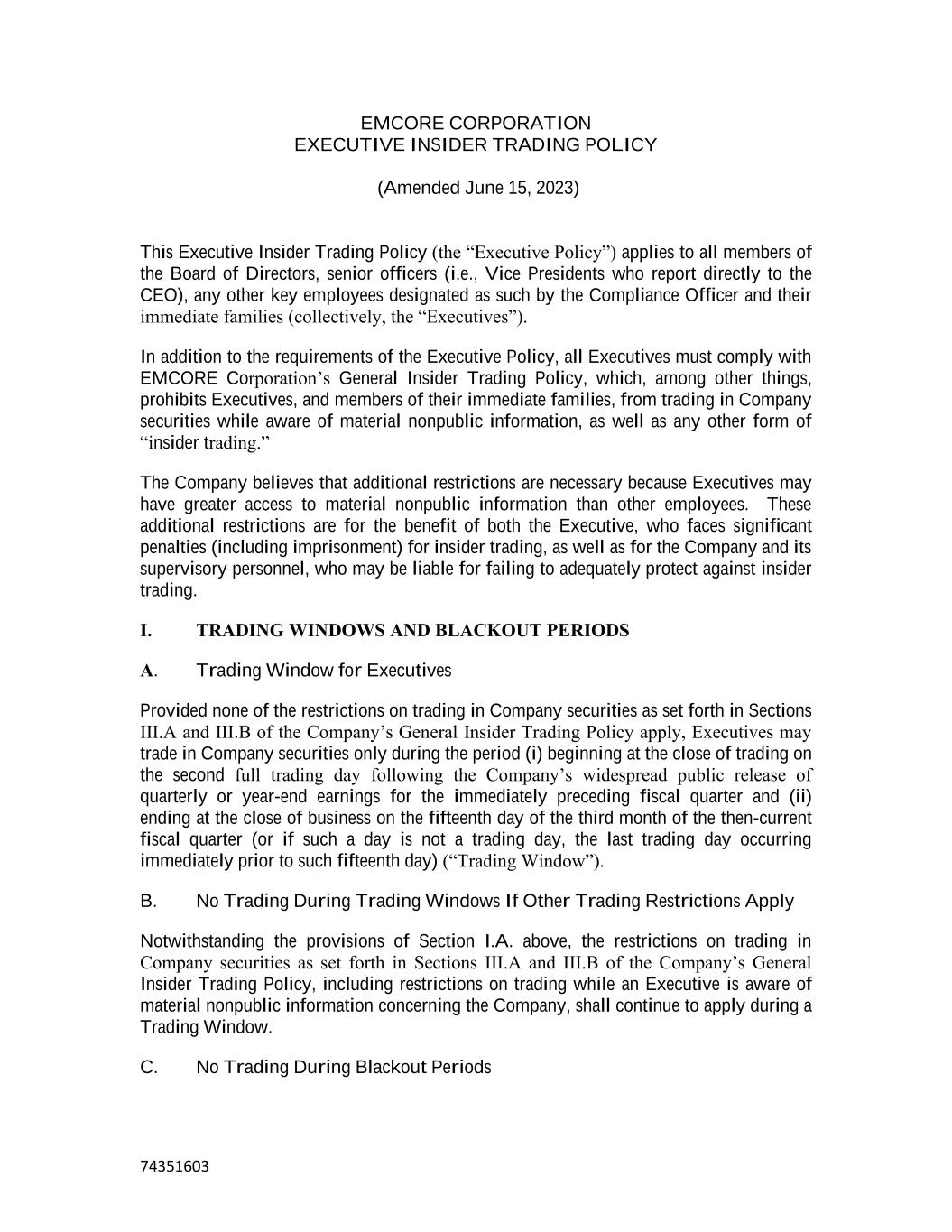
74351603 EMCORE CORPORATION EXECUTIVE INSIDER TRADING POLICY (Amended June 15, 2023) This Executive Insider Trading Policy (the “Executive Policy”) applies to all members of the Board of Directors, senior officers (i.e., Vice Presidents who report directly to the CEO), any other key employees designated as such by the Compliance Officer and their immediate families (collectively, the “Executives”). In addition to the requirements of the Executive Policy, all Executives must comply with EMCORE Corporation’s General Insider Trading Policy, which, among other things, prohibits Executives, and members of their immediate families, from trading in Company securities while aware of material nonpublic information, as well as any other form of “insider trading.” The Company believes that additional restrictions are necessary because Executives may have greater access to material nonpublic information than other employees. These additional restrictions are for the benefit of both the Executive, who faces significant penalties (including imprisonment) for insider trading, as well as for the Company and its supervisory personnel, who may be liable for failing to adequately protect against insider trading. I. TRADING WINDOWS AND BLACKOUT PERIODS A. Trading Window for Executives Provided none of the restrictions on trading in Company securities as set forth in Sections III.A and III.B of the Company’s General Insider Trading Policy apply, Executives may trade in Company securities only during the period (i) beginning at the close of trading on the second full trading day following the Company’s widespread public release of quarterly or year-end earnings for the immediately preceding fiscal quarter and (ii) ending at the close of business on the fifteenth day of the third month of the then-current fiscal quarter (or if such a day is not a trading day, the last trading day occurring immediately prior to such fifteenth day) (“Trading Window”). B. No Trading During Trading Windows If Other Trading Restrictions Apply Notwithstanding the provisions of Section I.A. above, the restrictions on trading in Company securities as set forth in Sections III.A and III.B of the Company’s General Insider Trading Policy, including restrictions on trading while an Executive is aware of material nonpublic information concerning the Company, shall continue to apply during a Trading Window. C. No Trading During Blackout Periods
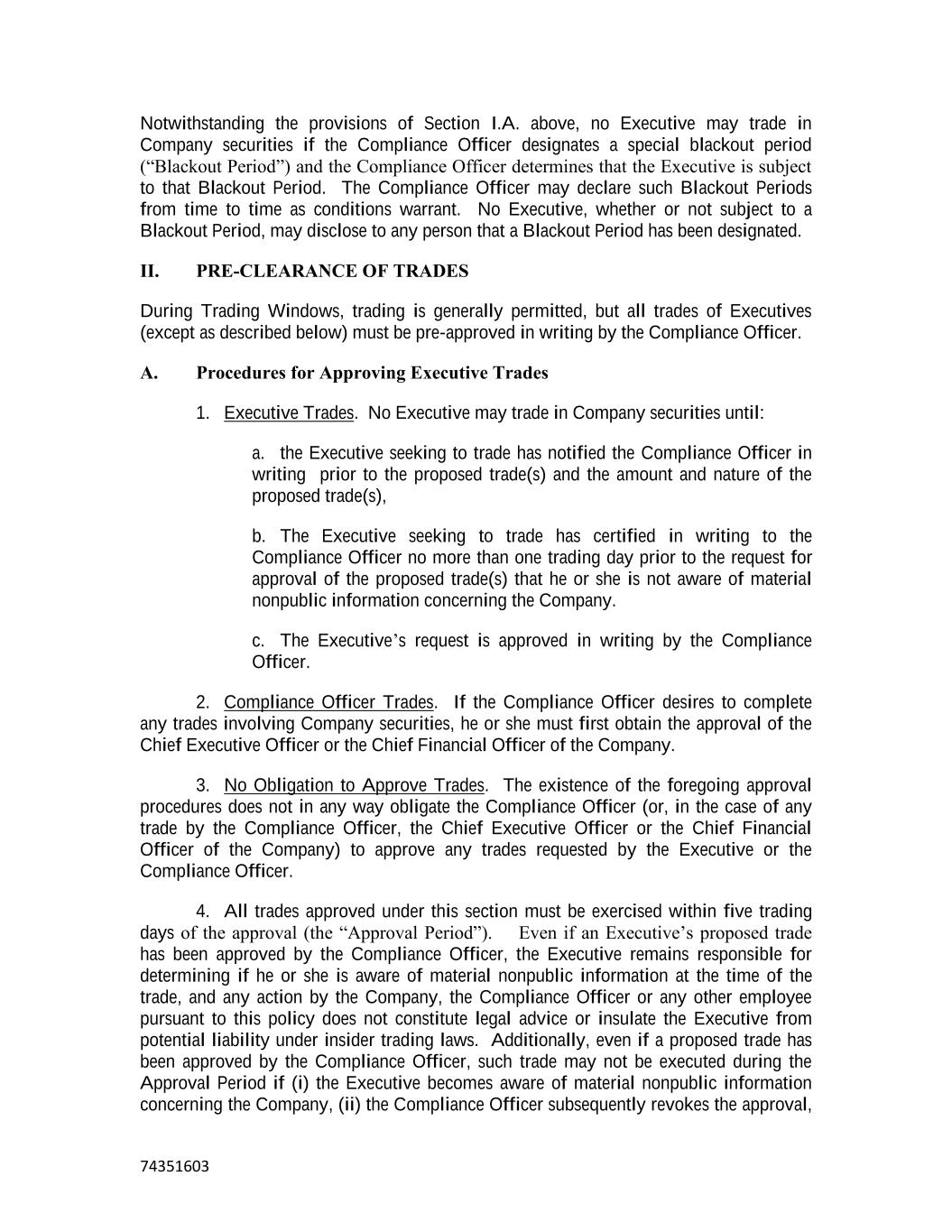
74351603 Notwithstanding the provisions of Section I.A. above, no Executive may trade in Company securities if the Compliance Officer designates a special blackout period (“Blackout Period”) and the Compliance Officer determines that the Executive is subject to that Blackout Period. The Compliance Officer may declare such Blackout Periods from time to time as conditions warrant. No Executive, whether or not subject to a Blackout Period, may disclose to any person that a Blackout Period has been designated. II. PRE-CLEARANCE OF TRADES During Trading Windows, trading is generally permitted, but all trades of Executives (except as described below) must be pre-approved in writing by the Compliance Officer. A. Procedures for Approving Executive Trades 1. Executive Trades. No Executive may trade in Company securities until: a. the Executive seeking to trade has notified the Compliance Officer in writing prior to the proposed trade(s) and the amount and nature of the proposed trade(s), b. The Executive seeking to trade has certified in writing to the Compliance Officer no more than one trading day prior to the request for approval of the proposed trade(s) that he or she is not aware of material nonpublic information concerning the Company. c. The Executive’s request is approved in writing by the Compliance Officer. 2. Compliance Officer Trades. If the Compliance Officer desires to complete any trades involving Company securities, he or she must first obtain the approval of the Chief Executive Officer or the Chief Financial Officer of the Company. 3. No Obligation to Approve Trades. The existence of the foregoing approval procedures does not in any way obligate the Compliance Officer (or, in the case of any trade by the Compliance Officer, the Chief Executive Officer or the Chief Financial Officer of the Company) to approve any trades requested by the Executive or the Compliance Officer. 4. All trades approved under this section must be exercised within five trading days of the approval (the “Approval Period”). Even if an Executive’s proposed trade has been approved by the Compliance Officer, the Executive remains responsible for determining if he or she is aware of material nonpublic information at the time of the trade, and any action by the Company, the Compliance Officer or any other employee pursuant to this policy does not constitute legal advice or insulate the Executive from potential liability under insider trading laws. Additionally, even if a proposed trade has been approved by the Compliance Officer, such trade may not be executed during the Approval Period if (i) the Executive becomes aware of material nonpublic information concerning the Company, (ii) the Compliance Officer subsequently revokes the approval,
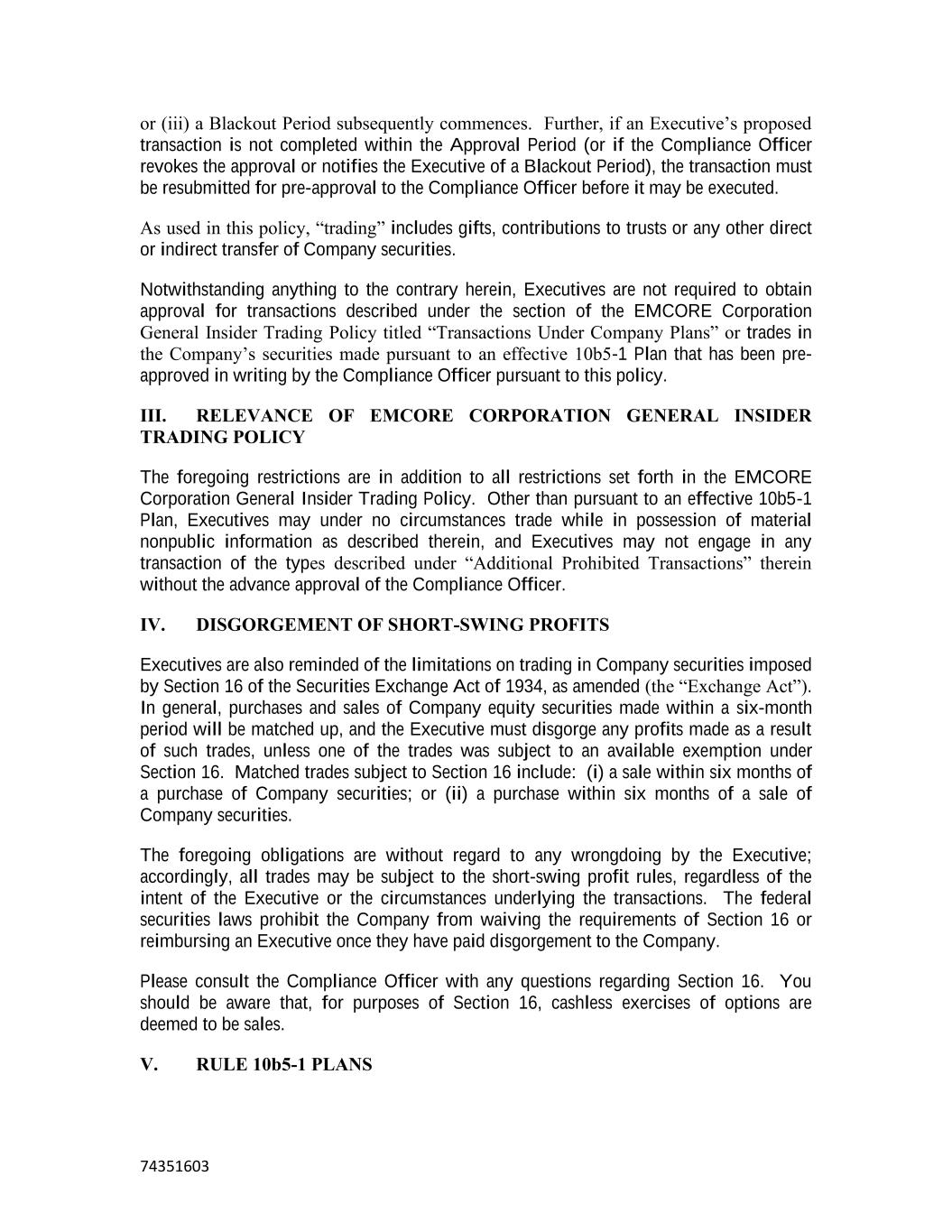
74351603 or (iii) a Blackout Period subsequently commences. Further, if an Executive’s proposed transaction is not completed within the Approval Period (or if the Compliance Officer revokes the approval or notifies the Executive of a Blackout Period), the transaction must be resubmitted for pre-approval to the Compliance Officer before it may be executed. As used in this policy, “trading” includes gifts, contributions to trusts or any other direct or indirect transfer of Company securities. Notwithstanding anything to the contrary herein, Executives are not required to obtain approval for transactions described under the section of the EMCORE Corporation General Insider Trading Policy titled “Transactions Under Company Plans” or trades in the Company’s securities made pursuant to an effective 10b5-1 Plan that has been pre- approved in writing by the Compliance Officer pursuant to this policy. III. RELEVANCE OF EMCORE CORPORATION GENERAL INSIDER TRADING POLICY The foregoing restrictions are in addition to all restrictions set forth in the EMCORE Corporation General Insider Trading Policy. Other than pursuant to an effective 10b5-1 Plan, Executives may under no circumstances trade while in possession of material nonpublic information as described therein, and Executives may not engage in any transaction of the types described under “Additional Prohibited Transactions” therein without the advance approval of the Compliance Officer. IV. DISGORGEMENT OF SHORT-SWING PROFITS Executives are also reminded of the limitations on trading in Company securities imposed by Section 16 of the Securities Exchange Act of 1934, as amended (the “Exchange Act”). In general, purchases and sales of Company equity securities made within a six-month period will be matched up, and the Executive must disgorge any profits made as a result of such trades, unless one of the trades was subject to an available exemption under Section 16. Matched trades subject to Section 16 include: (i) a sale within six months of a purchase of Company securities; or (ii) a purchase within six months of a sale of Company securities. The foregoing obligations are without regard to any wrongdoing by the Executive; accordingly, all trades may be subject to the short-swing profit rules, regardless of the intent of the Executive or the circumstances underlying the transactions. The federal securities laws prohibit the Company from waiving the requirements of Section 16 or reimbursing an Executive once they have paid disgorgement to the Company. Please consult the Compliance Officer with any questions regarding Section 16. You should be aware that, for purposes of Section 16, cashless exercises of options are deemed to be sales. V. RULE 10b5-1 PLANS
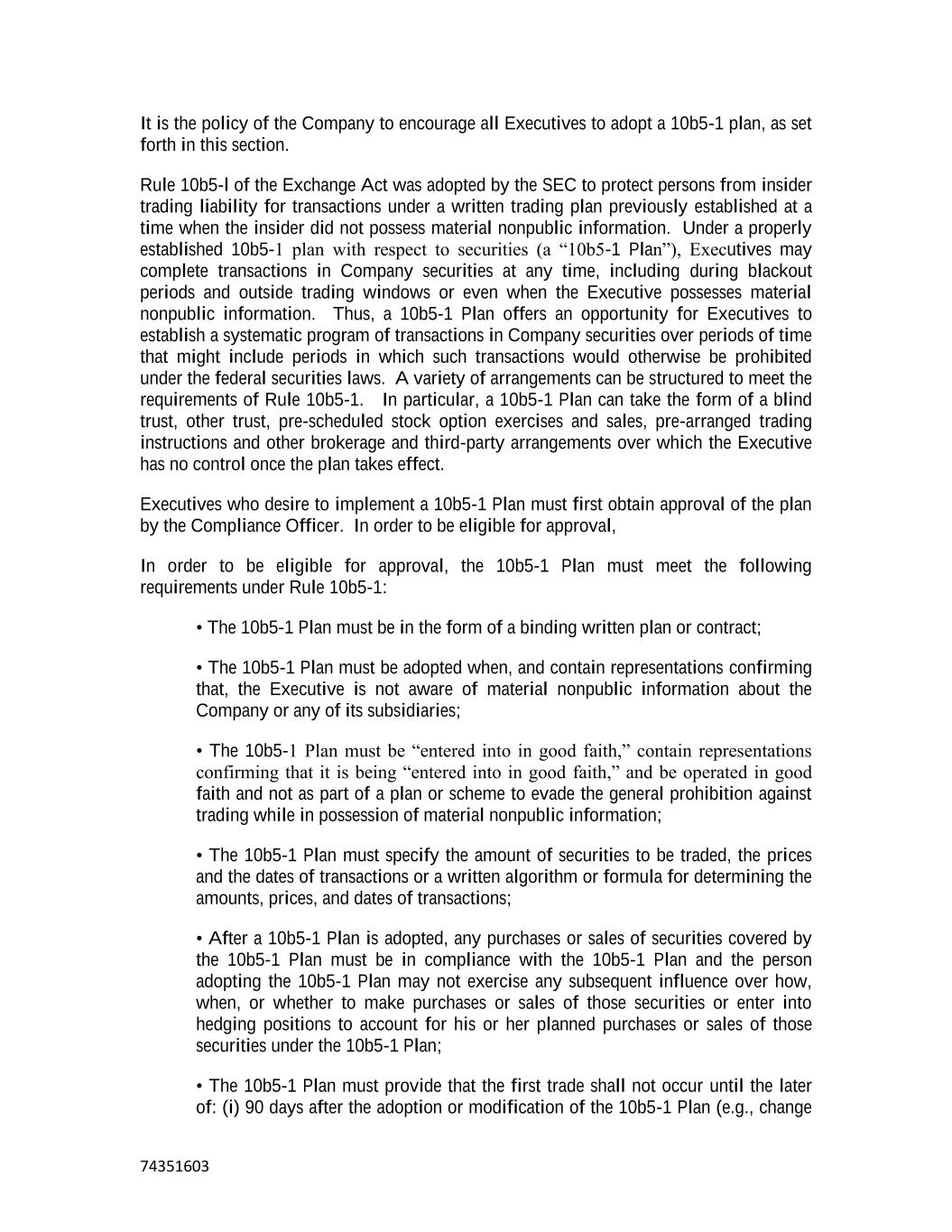
74351603 It is the policy of the Company to encourage all Executives to adopt a 10b5-1 plan, as set forth in this section. Rule 10b5-l of the Exchange Act was adopted by the SEC to protect persons from insider trading liability for transactions under a written trading plan previously established at a time when the insider did not possess material nonpublic information. Under a properly established 10b5-1 plan with respect to securities (a “10b5-1 Plan”), Executives may complete transactions in Company securities at any time, including during blackout periods and outside trading windows or even when the Executive possesses material nonpublic information. Thus, a 10b5-1 Plan offers an opportunity for Executives to establish a systematic program of transactions in Company securities over periods of time that might include periods in which such transactions would otherwise be prohibited under the federal securities laws. A variety of arrangements can be structured to meet the requirements of Rule 10b5-1. In particular, a 10b5-1 Plan can take the form of a blind trust, other trust, pre-scheduled stock option exercises and sales, pre-arranged trading instructions and other brokerage and third-party arrangements over which the Executive has no control once the plan takes effect. Executives who desire to implement a 10b5-1 Plan must first obtain approval of the plan by the Compliance Officer. In order to be eligible for approval, In order to be eligible for approval, the 10b5-1 Plan must meet the following requirements under Rule 10b5-1: • The 10b5-1 Plan must be in the form of a binding written plan or contract; • The 10b5-1 Plan must be adopted when, and contain representations confirming that, the Executive is not aware of material nonpublic information about the Company or any of its subsidiaries; • The 10b5-1 Plan must be “entered into in good faith,” contain representations confirming that it is being “entered into in good faith,” and be operated in good faith and not as part of a plan or scheme to evade the general prohibition against trading while in possession of material nonpublic information; • The 10b5-1 Plan must specify the amount of securities to be traded, the prices and the dates of transactions or a written algorithm or formula for determining the amounts, prices, and dates of transactions; • After a 10b5-1 Plan is adopted, any purchases or sales of securities covered by the 10b5-1 Plan must be in compliance with the 10b5-1 Plan and the person adopting the 10b5-1 Plan may not exercise any subsequent influence over how, when, or whether to make purchases or sales of those securities or enter into hedging positions to account for his or her planned purchases or sales of those securities under the 10b5-1 Plan; • The 10b5-1 Plan must provide that the first trade shall not occur until the later of: (i) 90 days after the adoption or modification of the 10b5-1 Plan (e.g., change
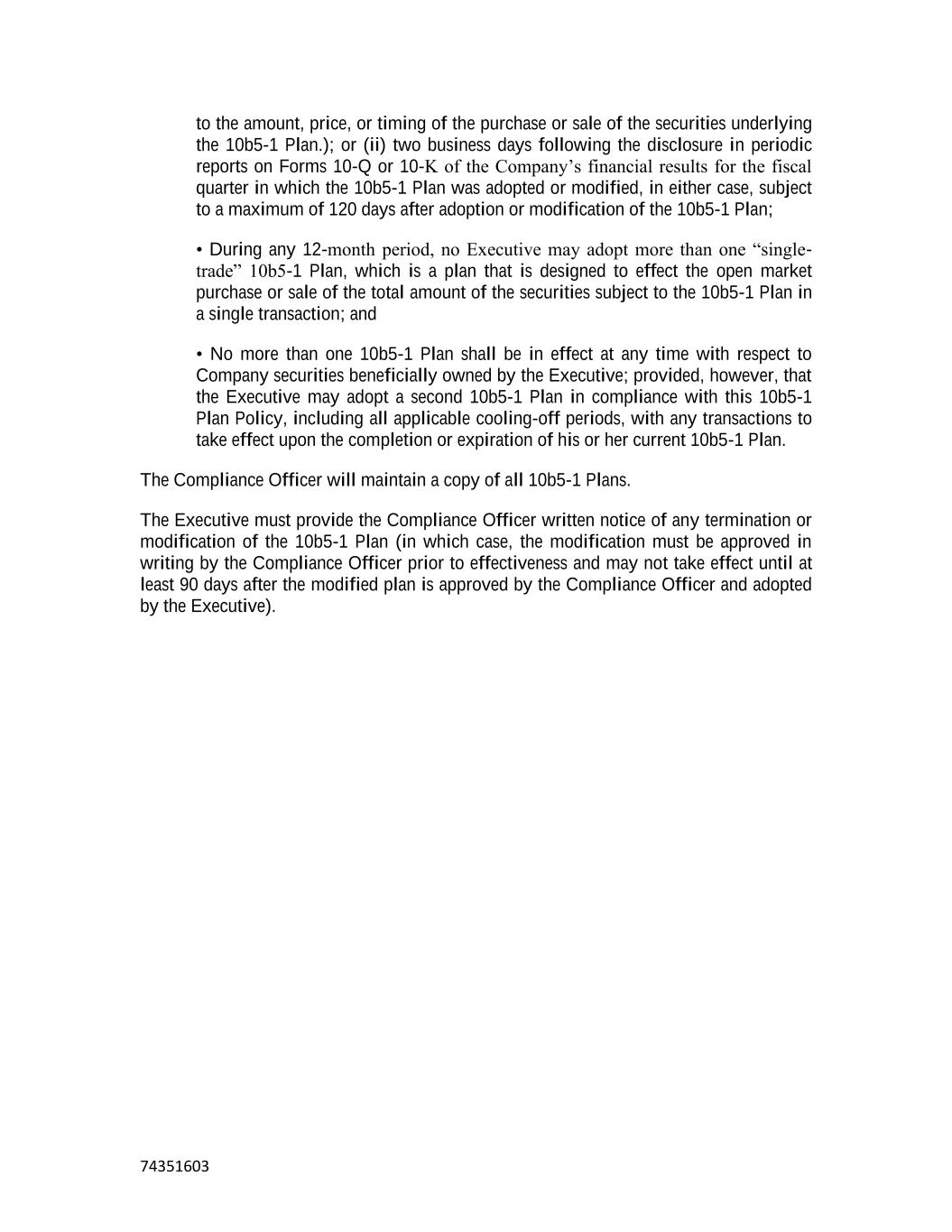
74351603 to the amount, price, or timing of the purchase or sale of the securities underlying the 10b5-1 Plan.); or (ii) two business days following the disclosure in periodic reports on Forms 10-Q or 10-K of the Company’s financial results for the fiscal quarter in which the 10b5-1 Plan was adopted or modified, in either case, subject to a maximum of 120 days after adoption or modification of the 10b5-1 Plan; • During any 12-month period, no Executive may adopt more than one “single- trade” 10b5-1 Plan, which is a plan that is designed to effect the open market purchase or sale of the total amount of the securities subject to the 10b5-1 Plan in a single transaction; and • No more than one 10b5-1 Plan shall be in effect at any time with respect to Company securities beneficially owned by the Executive; provided, however, that the Executive may adopt a second 10b5-1 Plan in compliance with this 10b5-1 Plan Policy, including all applicable cooling-off periods, with any transactions to take effect upon the completion or expiration of his or her current 10b5-1 Plan. The Compliance Officer will maintain a copy of all 10b5-1 Plans. The Executive must provide the Compliance Officer written notice of any termination or modification of the 10b5-1 Plan (in which case, the modification must be approved in writing by the Compliance Officer prior to effectiveness and may not take effect until at least 90 days after the modified plan is approved by the Compliance Officer and adopted by the Executive).